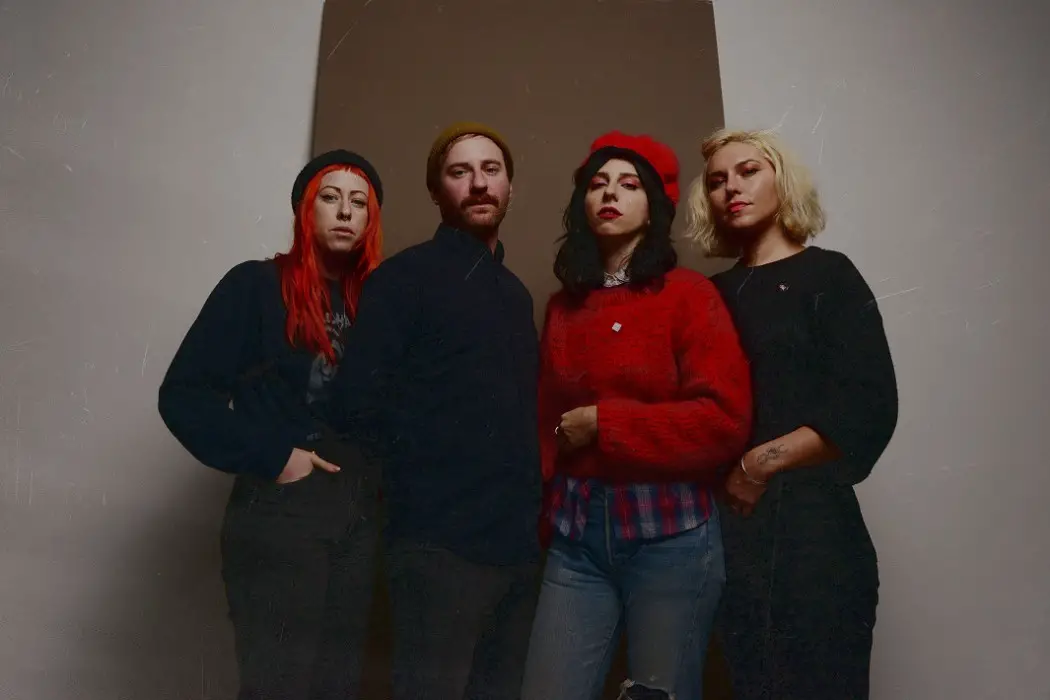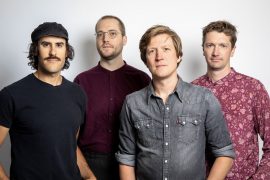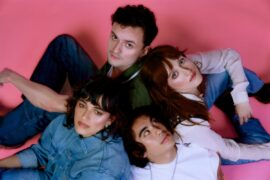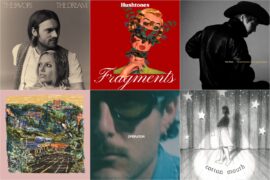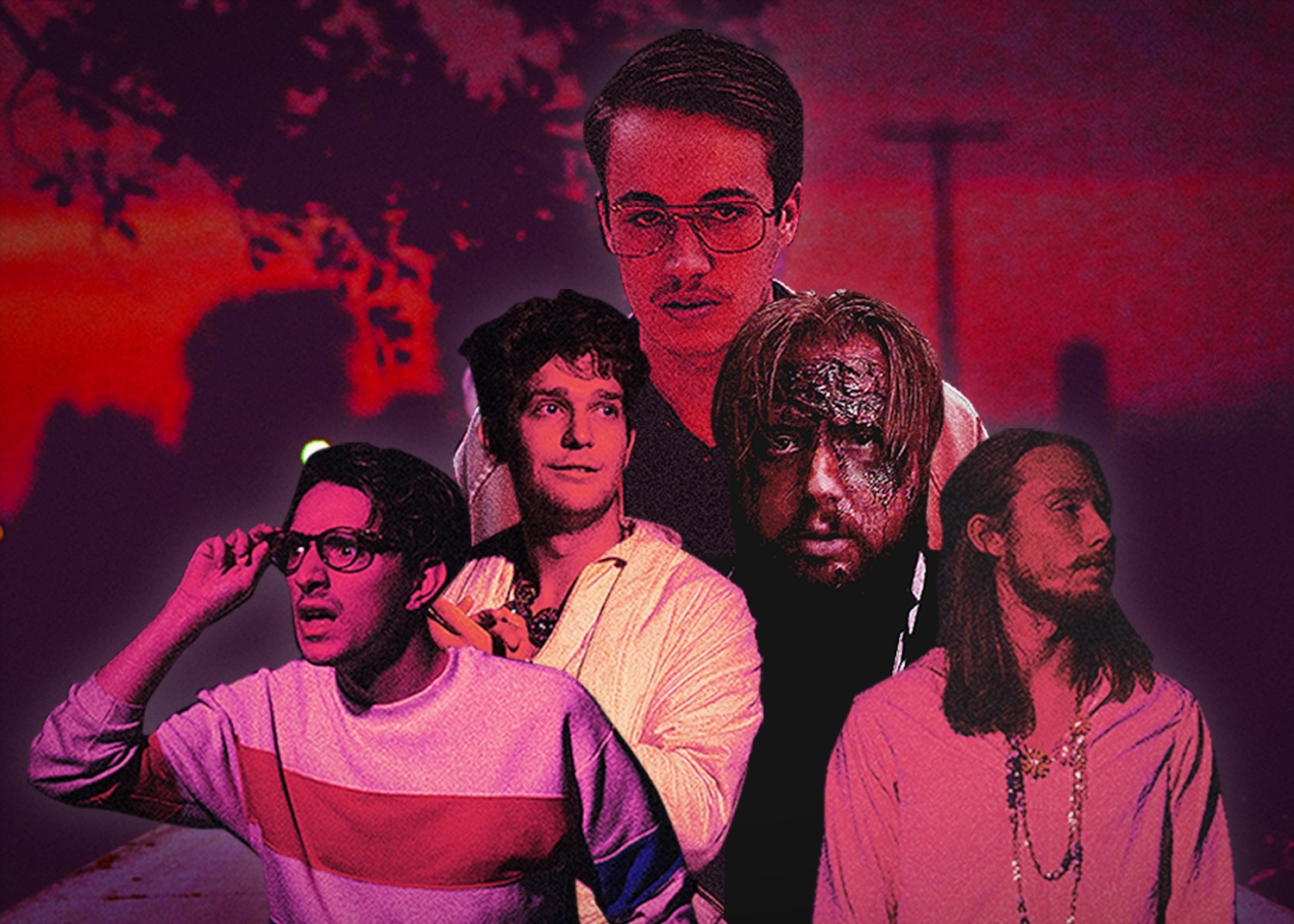In the midst of a fast-paced European tour, Los Angelenos FEELS discuss their sophomore album ‘Post Earth’, the nature of touring Europe, the evolution of their production style and the viability of covering “Let’s All Go to the Lobby” in a post-punk milieu.
Stream: ‘Post Earth’ – FEELS
The VOID in Bordeaux was quite clearly not made for me. A punk-and-metal garage venue that takes its cues from CBGB, knackered and graffiti’d.
Except you can tell the VOID is a little more couture about itself (and I say this endearingly: bloody French), I mean, would CBGB really line-up festival posters for the Talking Heads, Ramones, Blondie or the European Punk Rock Festival of ‘76? Shit, festival culture was but a nascent babe back then, the dive-bar punks would have eaten those posters alive, glass and all, bleeding out just to spite the body! (Or at least the Iggy Pop wannabe iconoclasts would have, in their ironic emulation.) But along the entrance walls remained a very clear and present cleanliness, art-nouveau gothica for Hellfest, Graveyard, Wo Fat, Saint Vitus and Celeste Vampire among Dada-esque, aboriginal and lithographic art designs, creative and aleatory, but arranged. There was a veil here, so thick and put on, it transformed the band sticker spread into pure bukkake over the bar head.

There were two stairwells that led down to the basement; one in the main hall, by the bar, curling downward to the audience area, and one just past the main entrance hall replete with the aforementioned posters, leading down to the backstage area, covered in grubby markings and graffiti etchings (that’s more like it!). The backstage is often given an aura of sexiness that it doesn’t deserve. Mostly in my own head, replete with Seventies-era biopics, rockumentaries and Lester Bangs testimonials, which meander between rose-tinted kumbaya fables and scathingly precise details. At The VOID, the backstage is a den, cigarettes stained my nostrils, French babble chätouille cozy against my ears, I sat on what felt like a worn out casting couch.
So it was there I went about asking Laena Geronimo, Shannon Lay, Amy Allen and Michael Perry Rudes (also known as FEELS) about their recently-released sophomore album Post Earth (released February 2019 via Wichita Recordings), the nature of touring in Europe, the evolution of their production style, and more that the ers and the likes and the blablabla’s gotta little out o’ hand, y’know? We West-Coasters are a bit prone to this oily language, linguistic lubrication that it is, and it was that way as we sat for half-an-hour while Magnetix raged behind us in their puckish-punkish Chuck Berryisms. It also didn’t help that FEELS were on that indie wagon life, traveling like troubadors all through the day from a witching hour gig in Barcelona to a garage séance in Bordeaux. They were downright dog-tired — which made their performance all the more impressive.
During the performance, the spirit of Penny Lane moved through me, whispering in my ear to put the notebook down and as a result I have just four notes:
- Fellas, find yourself a lady who throws herself at you like Amy Allen throws herself at her bass.
- Ladies, find yourself someone who knows you from within like Shannon Lay knows her guitar.
- Queerfolk, find yourself someone who delights in you like Laena Geronimo delights in her bandmates.
- And whoever the fuck you are, find someone who will reinforce you like Michael Perry Rudes reinforces nearly every moment of FEELS.
As for the conversation? That was 30 minutes, 12 pages, refined down to six and curated to what rests below.
To me, it’s mostly about turning the brain off. It’s letting things flow through you without judging them, or categorizing them.
:: stream/purchase Post Earth here ::
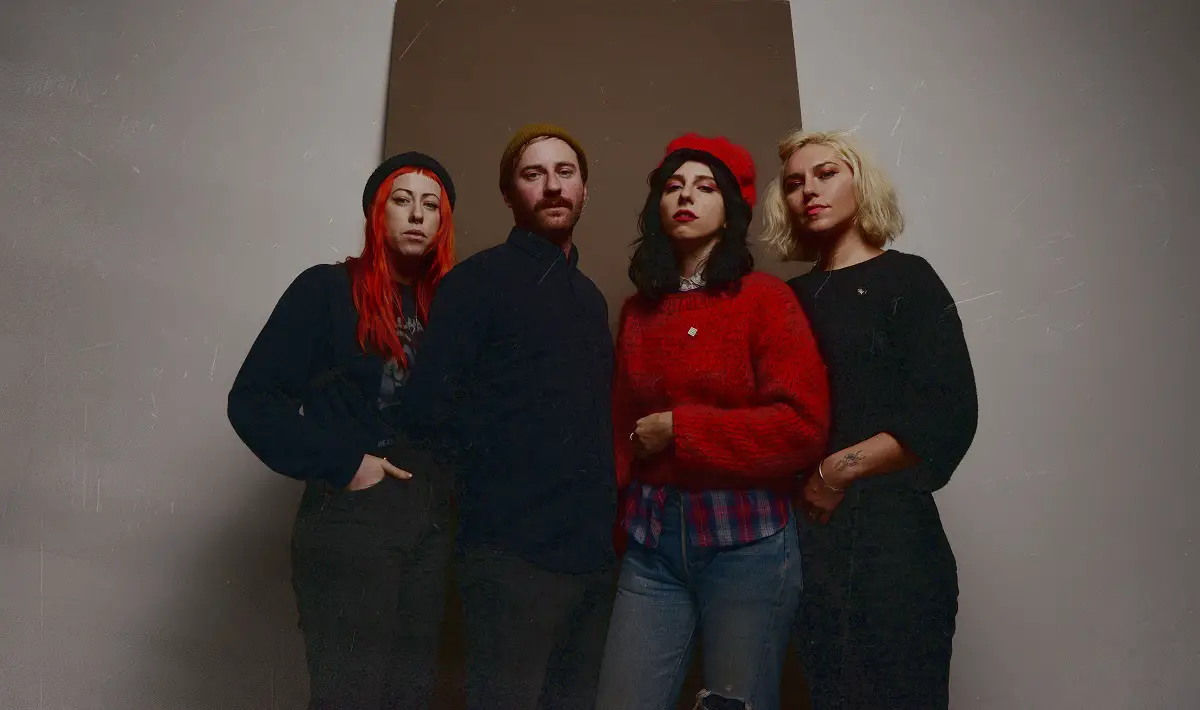
A CONVERSATION WITH FEELS
Atwood Magazine: FEELS, where did that come from?
Shannon Lay: In that time that we were playing together, we realized that were really emphasizing the directions we were going on how stuff felt. Like, we would just be playing something and saying, ‘Oh that doesn’t feel right’ or ‘that feels really good,’ trying not to intellectualize it too much and just keep it like a very visceral reaction to sound. And so we just kept saying the word and then we were looking for a new band name and that one was kinda on a list that just kept staying on the list even though other ideas changed. And so after a few months of that we just decided that that was it.
About the all caps name: do you feel like that’s a trend, like a fad? Because I've noticed there’s a lot of bands who have the all-caps name, like FIDLAR.
Lay: It’s just an aesthetic thing, I think. There’s a couple other “Feels” out there and we thought it would set us apart and it also just works as a great logo, it looks amazing in all caps.
Amy Allen: All those right-angles; they look nice to write out.
Lay: Very appealing.
Have you guys enjoyed Europe at all?
*an outbursting rabble of yeah*
Lay: Absolutely, we love it here.
Any favorite cities, besides, well I was gonna ask about Bordeaux but you guys got in late, so I guess Bordeaux’s been struck off the list.
Michael Perry Rudes: We were here in 2016, and the first show that we played in Europe was here, in Bordeaux, and we played in front of Saint-Michel, the big cathedral out there and it was right after we got off a plane that was like nine hours or whatever, and then drove six hours and then immediately got thrown on stage in front of a couple thousand people. And it felt crazy, but we had a really good time.
Laena Geronimo: Being on tour is always kinda like that too… even if we’d gotten here in time to soundcheck we would have just been sound-checking. It’s not like we’d be exploring the city. We played in Barcelona at, like, two in the morning last night.
I heard.
Geronimo: Yeah, you just, y’know, you —
Rudes: – roll with it.
Geronimo: Yeahhh.
It’s because they have siestas.
Rudes: Yeah, exactly. God bless ‘em.
Moving on to Post Earth, it feels, just even from its title, like it’s more politically-minded.
Lay: Yeah, I think it was just the current climate, it had everybody on edge and it wasn’t an intentional thing to make something super political but it was just all we could think about. And I think whatever you’re experiencing is what you end up writing about.
’Find a Way’ was the song that grabbed me because of its anthem-like qualities. When I was listening to it, it felt very U.S.-centric, but reading the lyrics, I don’t know if you guys were thinking U.S.-centrically or going for something more global?
Allen: I don’t think it’s possible to be so centric when we’re all living on the same planet… I think that punk music—and not just punk music, necessarily—but music in general can be a really great channel and a really positive place to put those feelings and bring people together who also feel that way and make people feel like they’re not alone in feeling that way. Y’know, it’s powerful, it’s powerful stuff.”
I remember I was reading Pitchfork and they were talking about how you guys were almost, whether intentionally or not, building a new vision of the world out of the garbage of the old.
Rudes: What’s the alternative? What else is there to do?
Allen: There’s no time machines that I’m aware of to hop in and stop some people from doing some devastating things but, y’know, we can only be optimistic in how move forward.
Geronimo: We always think of the pendulum swinging… so far in a sort of destructive direction that, well, it has to swing back, and hopefully all the frustration that people are feeling will inspire people to really rise to the challenge and we can change the world.
Pivoting to a different subject: Band similarities. When a reviewer, like me, gets the genius idea that ‘oh, they’re like Sleater-Kinney!’ and says that, do you find that useful or kinda like neat?
Geronimo: I’d say neat, between the two.
Lay: I think that you find that it’s essential for people to put it in that kind of category to feel comfortable, and just inevitably the things that we create are inspired by the things that were. So, to compare it to something is natural.
Geronimo: It’s interesting too, because people tell us different things all the time, which I actually love, y’know. One night someone will be like, ‘You remind me of the Smashing Pumpkins!’ and then someone else will be like, ‘Wow, you remind me so much of Wire!’… And you’re like, those two bands don’t sound very similar but that’s so cool.

Which brings me to my next question. If you’re songwriting, you don’t really think about, like, what influenced you; you’re kinda just thinking in parts, aren’t you?
Geronimo: To me, it’s mostly about turning the brain off. It’s letting things flow through you without judging them, or categorizing them.
Lay: Yeah, it comes from a bigger place, but at the same time you can’t deny the things that are the ingredients of the stew that is you—and you’re full of just everything that you’ve ever loved, so of course that stuff’s going to come out.
Allen: And there is a little healthy pinch of, when you’re writing a record, you look at what you have—and you look at it like this puzzle—and you’re like, where are the missing pieces, what do we need to throw into this record to make it feel like a complete thing?
Rudes: You chisel it out, like a sculpture. Also, we all have our own voice, our own artistic voice and when we put them together, it kinda creates a whole new thing.
Allen: It’s a gestalt.
You’re getting all German on me, all I know is French. I don’t even know what gestalt means, dang it!
Allen: It’s like the pieces—the sum of the pieces—are greater than the individual parts.
You’re kind of getting into Led Zeppelin territory where it becomes a, let’s say, a bigger entity than just, say, John Paul Jones' keyboards or Shannon’s, well, I don’t know - do you fingerpick on Post Earth, by the way?
Lay: Just one, on “Awful Need,” I put the pick down. On “Flowers,” too, a little bit on the end of “Flowers,” I get a little saucy.
Speaking of “Awful Need,” was there a story behind that? Because it felt like… You’ve just been sort of sitting on the wall, not judging, but taking notes.
Lay: Yeah… I worked at this vintage store where you could check out clothes and bring ‘em back and I would just be a different person every week. I’d be a hippy, I’d be a punk, I’d be a rockabilly girl, like, I was just trying on all these masks and eventually I realized that it’s not the most important thing in the world to have a set thing, like, I am this thing… You’re always going to discover new aspects of yourself and I think that’s the theme of that song: Don’t get too attached to who you think you are, because you never knew who you’re going to become and you have to allow yourself to make that transition to become that person or you’re just stuck.
Don’t get too attached to who you think you are, because you never knew who you’re going to become!
Pivoting again, I’m gonna be like Ross from Friends; “Pivot! Pivot!” So, Amy, during, Post-Earth, your basslines are a lot more out there... you have a lot more space to take a little bassline solo. Is it hard to — I don’t want to say fight — but is it hard to find that space when you’re mixing?
Allen: Uh, yeah… in the first record, a lot of the bass was just going along with the guitar melodies for maybe like half the song and in this record I definitely, like, made space to carve out some of my own melodies, which, in addition to guitar melodies and vocal melodies, is kind of a whole delicious stew of melody and it worked out really well.
Geronimo: “We recorded [FEELS] all live pretty much in one day; the bass and the drums [were] recording at the same time in the same rooms so when you mix, just on a technical level, you can’t really bring one up without bringing up the other… The second record we took a little more time, we were able to isolate things and, like, bring them out and pull them back in order to mix it into this more spacious kinda dynamic. I think Amy was doing a lot of interesting stuff on the first record too, you just probably can’t hear it that well.”
Yeah, it’s just really hard to hear. One of the songs where I think you all came together as a group unit on Post Earth in particular was ‘Sour’—
Lay: Oh, yeah –
Allen: – That one was fun to write –
- Basically, if The Warriors was remade in L.A., they would use “Sour” for when the group is running through L.A. at night.
Rudes: whistles
Geronimo: That’s awesome.
Lay: I love that — that was literally a jam, like we were jamming in the practice basement and we had certain parts that stood out to us and we just put them all together and I don’t think that song could have been written any other way, it’s just so… organic, I guess.

How was working with (producer) Tim Green? Were there any Jedi Master stories or moments where he, er, pulled out from all those years of experience, like a punk guru?
Allen: He’s like a very understated, wildly genius, kind of person.
Lay: Very, very cool tempered, an-and wildly genius and he’ll tell us to do it again if we need to do it again and if we don’t he won’t say anything, so it’s like, y’know, we just did our thing and he spoke up in the right moments and just let us have at it.
Geronimo: He’s sort of like a facilitating type role.
Rudes: He’s just very zen.
Lay: Also, where we recorded, it’s just in the middle of nowhere an hour-and-a-half north of San Francisco, in this gorgeous, wooded area and studio is in this amazing barn. So, just the vibe is incredible, it puts ya in a headspace immediately; you’re stoked that you’re there.
Michael, it sounded like you were playing a bit with fills… like you were trying to spice it up. Do you try and find ways to spice up a song or are you mostly just trying to find ways to serve the song?
Rudes: Yeah, both, both really. Like, philosophically, I’ve always wanted to do something a little bit different… I also try to keep things fairly minimal to try to serve the song, y’know, there’s not a lot of drum solos on [Post Earth], thank God, but—
Allen: We’ll make you do one tonight—
Rudes: (nervously) Okay…
Allen: I think we’re all just working to serve the song.
Lay: Yeah, no one’s like, jackin’-off.
Geronimo: Yeah, there’s not like a ‘ok, take it away!’
Rudes: I like to think I’ve been working a while to develop my own voice on the drums, and hopefully that’s what you’re pickin’ up on.
Yeah, I remember my college professor once said: If you’re a drummer, you serve the song by being a delineator of time, and the worst drummers are those who don’t know how to equally delineate time, the best drummers are those who know how to work with time.
Rudes: I definitely agree! I also had a lot of help, y’know, we definitely chiseled away on these beats to really find the right fit for things. A lot of things came organically out of jams but then… we spent several months, boiling it down.’
Geronimo: There’s been so many version of some of the songs, y’know, if anyone has an idea, we’ll try it… There’s no reason to shoot something down before you ever try it, because then you’ll never know. So sometimes that chorus, it just don’t feel right, so let’s try this, let’s try that, how about this, maybe it’s this, y’know, so we really work together like that.
There’s no reason to shoot something down before you ever try it, because then you’ll never know.
Which song in particular was the problem child?
Geronimo: I’d say “Post Earth.” We recorded, like, four different demos of it before we found the spot.
Rudes: Even now, live.
Allen: Yeah, I mean, really that’s how we refine songs, is working them out live, y’know.
Gotta go the Dead route.
Lay: Yeah.
I’m still getting the vibe that it would be not possible to do a “Moby Dick” or a “Drums/Space” sort of thing in a sort of post-punk record.
Rudes: Anything is possible, yeah, we’ll see.
Lay: Challenge accepted, let’s put it that way. [laughs]
Okay, then, now I really look forward to the third record, whenever that may be, we’re gonna get really spacey.
Rudes: Yeah, I got some ideas, actually.
Allen: We’ll just rewrite that ‘Let’s All Go to the Lobby,’ preview…
Rudes: *singing in monotone* “Let’s all go to the looobby…
Lay: With just drums.
— —
:: stream/purchase Post Earth here ::
— — — —

Connect to FEELS on
Facebook, Twitter, Instagram
Discover new music on Atwood Magazine
? © Shervin Lainez

